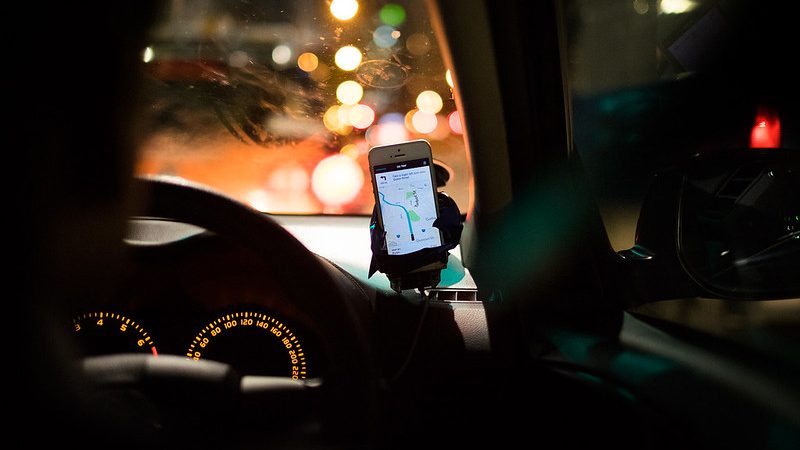"The government turned a blind eye as gig economy companies cut corners on health and safety," the IWGB union says.

A trade union representing so-called ‘gig economy’ workers is taking the government to court this week, in a judicial review that could extend health and safety rights to hundreds of thousands of precarious workers.
The Independent Workers’ Union of Great Britain (IWGB) is in the High Court today, arguing that Covid-19 has made workers’ rights a public health issue – with thousands of couriers, food deliverers and ride-hailing drivers denied basic Personal Protective Equipment and health and safety rights.
If successful, the judicial review would force the Government to extend health and safety protections to all those classed as ‘workers’ (rather than formal employees), including hundreds of thousands in the so-called gig economy.
Many of these workers, including Uber drivers and parcel couriers were designated ‘key workers’ by the government during the first wave of Covid-19.
Victory for the union would win them all a legal right to Personal Protective Equipment (PPE) and to take legal action against employers who dismiss them for refusing work in dangerous conditions.
Left Foot Forward is attending the hearing. Speaking at on Wednesday, Ijeoma Omambala QC, representing the union, said PPE is ‘not being provided’ to many workers who aren’t formally employees: “That provides a risk not just to the union’s members, but to their family and the wider community”.
She pointed to a ride-hailing driver whose duties include taking customers to hospital – but who was not given any safety advice or PPE.
“We are now at a point when the infection rates are rising again, so the risks these members…have returned, if they indeed ever abated,” Ms Omambala QC told the court. She pointed to high death rates from Covid among many precarious jobs.
Yet they are ‘denied essential protection and support’, the union claims: “It is a lacuna in health and safety law – thrown into stark relief by the Covid pandemic,” Ms Omambala QC said.
She highlighted the case of a ride-hailing app worker, who’s duties include taking customers to hospital during the pandemic – but who not given any safety advice or PPE.
Opposing the union’s case, the government’s legal argument stated: “Whilst health and safety should not be subordinated to economic considerations, there remains a balance to be struck,” when it comes to providing gig economy workers with health and safety protections.
The legal argument also claimed that PPE is a ‘last, not first, resort’ and that the law did not require PPE to be provided to non-employees. Gig economy workers are often contractors with few established rights.
Ahead of the hearing, Henry Chango Lopez, president of the IWGB, said: “During the first wave we stepped out our front doors every Thursday to applaud key workers for the vital work they were doing, risks taken for all of us. Meanwhile, the government turned a blind eye as gig economy companies cut corners on health and safety. As a second wave approaches, it’s time for us all to stand by our frontline and demand basic protections for those going out to work each day to get us through this crisis.”
Mengistu Jabir, private hire driver and chair of the IWGB’s private hire drivers branch, added: “It’s impossible for us to get PPE, and when a passenger refuses to wear a mask or sit in the back seat and I say something, I’m risking my job if I speak up.”
The IWGB is arguing that the UK Government failed in its obligation to transpose health and safety directives from EU law into UK law.
Whereas UK health and safety law only protects employees, EU law extends these protections to all those classified as workers. This law applies until the end of the Brexit transition period and the government has repeatedly promised to retain EU derived employment rights into the future.
The Secretary of State for Business, Energy and Industrial Strategy has joined as a second defendant to the proceedings, alongside the Secretary of State for Work and Pensions.
The IWGB has launched a crowdfunder to cover the potential cost liabilities, which the judge has now capped to £4,500. The union is represented by Ijeoma Omambala QC and Cyril Adjei of Old Square Chambers and Kate Harrison and Harry Campbell of Harrison Grant LLP.
The case is expected to continue on Thursday. The Department for Work and Pensions was contacted for comment.
Josiah Mortimer is co-editor of Left Foot Forward.
Image credit: Noel Tock
Left Foot Forward doesn't have the backing of big business or billionaires. We rely on the kind and generous support of ordinary people like you.
You can support hard-hitting journalism that holds the right to account, provides a forum for debate among progressives, and covers the stories the rest of the media ignore. Donate today.



